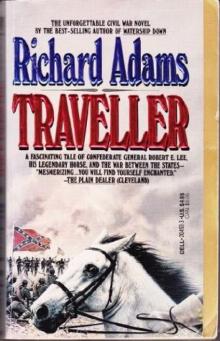- Home
- Richard Adams
Daniel Page 6
Daniel Read online
Page 6
“That was a nasty bang, lad,” he said. “How do you feel?”
“Not too good, sir, but I suppose it’ll pass off.”
“Well, if I were you, I’d go and lie down for a bit. If you don’t feel like coming along to supper, I’ll ask Cookie to bring you something in your bunk; a drop of brandy wouldn’t hurt you, either. You just hop into bed, now, and I’ll bring you a tot.”
His sympathy made me feel better, but I was shocked and dizzy, and glad of his arm back to the cabin. Foster wasn’t there, and the kindly Bo’sun, having brought the brandy, made me drink it off neat. With his great topknot of hair and his hirsute arms, he rather resembled some large, hulking animal tending its offspring. He saw me between the blankets and tucked me in, so that I wondered whether he hadn’t got some children of his own back home.
“Now you just shut your eyes and have a good sleep, young fellow,” he said as he left me.
And sleep I did, almost at once. The cook, rather than disturb me, must have come and gone. When I woke, I found Foster kneeling on the floor beside my bunk. He was stroking my forehead and then, seeing that I was awake, leaned over and kissed me on the lips. As I turned my head away, he said “Oh, my darling, dear boy Daniel, we both know now, don’t we, our true feelings for each other? I love you with all my heart.”
I felt bewildered, and unable to make sense of what he was saying.
“Oh, my sweetest, most precious lad,” he went on. “You’re all the world to me, but you must have known that already. Known that I love you very dearly.” He slid one hand beneath my averted head, turned it to face him and kissed my mouth again. His hand prevented me from turning my lips away, and I felt his tongue thrusting between them. Then, groping, he pushed his other hand down beneath the blankets.
As I tried to struggle in the narrow bunk, everything fell into place: our evening walks down to the stream; his asking Reynolds to let him take me away; his lavish expenditure on smart clothes for me; his bargaining with Captain Longside for a single cabin for the two of us. And — ah, yes! — waiting to show what he really wanted until we were out at sea, bound for England, with no more than twenty-five other people aboard, none of whom would be likely to pay much attention to anything a black nigger boy might say. For what, might one guess, had Foster been sent to prison? And why did it suit him now to pretend to be a clergyman?
All this passed through my mind as I gave in to what he was doing. If I were to take a stand against him, not only would it get me nowhere on board the Robin Hood, but once we were ashore I would have destroyed any chance I could expect of help or support from him – and there would be nobody else to turn to.
Foster was so sharp set on what he wanted that he evidently did not perceive that he was getting no response from me. It didn’t take him long to gratify himself and then, after a few more perfunctory endearments and caresses, to go to his own bunk and sleep.
I lay awake, partly because my head was throbbing and painful, and partly because I needed to think. After much pondering, I decided that I would not only have to accede to Foster’s wishes, but actually to convince him that I felt as he did. At all costs, I must retain his friendship and willingness to help me when we had landed. But how to part from him when the time came? That would have to remain a matter of opportunity.
In the morning I felt feverish and told Foster that I thought it best to stay in my bunk for the time being. The Bos’un, when he looked in, said he would send Snowball along with some bread and a bowl of soup. The soup made me feel better, but Snowball, seeing that I was still poorly, said he would leave me to rest and come back in the afternoon.
The last days of the voyage remain among my worst memories. Doing the best I could to convince Foster that I felt for him as he did for me was a continual strain, of which gratifying his lust was the most disgusting part. It was fortunate for me that, despite his continual protestations of love, his natural disposition, (of which I believe he was quite unaware) was altogether selfish: he really thought that what he did was as enjoyable for me as for himself.
I don’t think it ever occurred to him that if I felt as he did, I would want to play a more active part. My passivity suited him and he looked no further. For me each time seemed more repellent than the last, and the thought that I was going to have to accompany him when we landed often brought me close to despair; to thinking that I would never be able to get away from him. For I had no money and where could I go?
There was one circumstance that, I thought, offered some vague grounds for hope. This was the discovery that Foster was, to use a plain word, stupid. He was not ignorant: I myself had ignorance enough for twenty boys. No; what he revealed, as we talked, was a kind of slow-minded obtuseness, an inability to perceive that one thing followed from another. One day, for instance, when Snowball had remarked casually, in the course of conversation, that the world took twenty-four hours to revolve on its axis, it became plain that for Foster this had no connection with the sun or the time of day, although he himself had taught me to tell the time by the clock. Nor had it ever occurred to him that times by the sun differ simultaneously in various parts of the world. Another day he showed that he had never realised that sound takes time to travel and that this is demonstrable.
Both Snowball and I were always careful to avoid any insistence or argument with him. Our toleration, while not, of course, making his company more pleasant, allowed me to hope that in some way or other his muddy mind might lessen the difficulty of escape if opportunity offered.
About six o’clock on a fine morning we duly sailed into harbour at Bristol and moored the ship at a quay convenient for unloading. The Captain went ashore to report at the harbourmaster’s office and to collect the money to pay off the crew. When he returned, they gathered on deck and he paid them one by one, sitting at a chair and table brought from his office.
Once paid, they were free to go ashore and most did so immediately. The Bo’sun, however, remained on deck, and the Captain asked Foster, Snowball and myself to do the same. Foster showed some impatience at this, and finally asked the Captain whether he and I were not now free to go. The Captain did not answer him but, turning to me, said, “Daniel, you are under arrest. Go below to my cabin and wait for me there.”
Before I could say a word, Foster broke out angrily, “What do you mean, Captain, by saying Daniel’s under arrest? What for? And by what authority are you acting?”
The Captain replied that aboard his ship he had power of arrest. He then turned to the Bo’sun and said, “Mr. Miles, please take Daniel and Watney below to my cabin and wait with them until I join you.”
All three of us, of course, obeyed him, so that I did not hear what Foster said next. As we entered the cabin, Snowball turned to me with a broad smile. I saw nothing to smile at, and was trembling with apprehension when Miles put a hand on my shoulder and said, “Don’t worry, Daniel. You’re not in trouble, so calm down.”
He, too, was smiling, so I did my best to do as he said. We had not long to wait until the Captain joined us. His first words were, “Mr. Foster is waiting on deck, unless he’s gone ashore, which he’s free to do if he wishes.” Then, looking at me, he said, “Daniel, you’re not under arrest. Just keep quiet and listen. Watney, tell Mr. Miles and Daniel what you told me yesterday.”
“Well, sir,” answered Snowball “during the crossing I became friendly with Daniel, and he told me that Mr. Foster had begun treating him in a way he didn’t like; a dirty way, sir. He’d been using him, sir, for, well for —”
“Buggery?” said the Captain.
“Yes, sir, that and — and, well, messing about with him and making him do nasty things and that.”
“Did Daniel tell you he didn’t like it?”
“Yes, sir, he did. But he said he was afraid to tell you or Mr. Miles, because he thought you wouldn’t — well, wouldn’t want to listen to him.”
“And you thought the same, didn’t you?”
“Yes, sir. Well, you see
, sir, I’ve had some experience, and I know that many captains and bo’suns think that such things are no business of theirs; that they’re quite normal among sailors on ships at sea. And then what with Mr. Foster being white, sir, and me and Daniel being black —”
“You changed your mind, didn’t you?”
“Yes, sir.”
“Why?”
“It was when Daniel told me that Mr. Foster meant to keep him with him, sir, after we were ashore, and he didn’t want to stay with Mr. Foster, but he had no money and no work and he didn’t know England at all, and he had no friends he could go to, so he couldn’t run away from Mr. Foster.”
“Daniel, is that true?”
“Yes, sir.”
“And so, Watney, you decided to tell me after all?”
“Yes, sir. You and Mr. Miles, sir.”
“Well, Mr. Miles, knowing you and your moral principles as I do, you no doubt feel that you want to help Daniel, get him away from Foster and perhaps find him a roof over his head and a job to go to?”
“Yes, Captain, sir,” said Miles.
“He behaved well on the voyage?”
“Yes, sir; he did. All the lads took a liking to him. No one interfered with him, though, not like Mr. Foster.”
“Well, please call Mr. Foster in.”
When Foster came in, the Captain said, “Now, Mr. Foster, before you say anything, just listen to me. First, Daniel doesn’t want to stay with you. He wants to leave you. Mr. Miles and I think that by law he’s free to do so.”
“But, sir,” broke in Foster, “he is my protégé.”
“He is not a slave. Not in this country. He is free to leave you. Where he decides to go is no business of yours.”
“But, sir–”
The Captain held up his hand. “We also know that during the recent crossing, you have abused him in filthy ways. You buggered him several times. That is against the law.”
“Sir–”
“We also know that you have been in prison in Winchester. We don’t know for what, but that will be on record. We also very much doubt whether you are in holy orders. Now, have you anything to say to us?”
“I — er — I shall take you to law, Captain. You will hear from my lawyer in due course.”
“My name and address are written on this piece of paper,” said the Captain. “Now take your luggage and leave the ship.”
I disembarked from the Robin Hood in the company of Mr. Miles. When I tried to thank him for all he had done to help me, he cut me short, saying that he had been only too glad to show up Foster for what he was and to get me away from him.
“He’s a villain, sure enough,” he said. “We could probably get him put back in prison if we wanted, only ‘twould be too much trouble. He’ll likely get himself back there in time.”
The docks were crowded, but no one seemed to think it unusual to see a black lad walking side by side with a brawny white man. There were several black men working in the gangs among the piled crates and roped bundles, none of whom bothered to take the least notice of me as I carried one of Mr. Miles’s bags, accepted a quid of his tobacco, spat it out on the stones and chattered with him.
“You’ve nowhere in particular to go, have you, Daniel?” he asked me; and when I replied that that was so, he went on, “Well, you’d better come home with me for the time being. I’ve got a notion I may be able to help you and perhaps myself at the same time. Can you keep a secret?”
“Oh, yes, yes, sir,” I replied, agog with expectation.
“So can I,” he chuckled and vouchsafed nothing more as we left the docks and came out into the bustle of the workaday city.
Bristol, capital of the west of England, the only big town to which I had ever been, overwhelmed me with its noise, and I could only stare about and holler one question after another as we made our way up the street, past the shops and counting houses, half-deafened by the hooves and wheels thundering over the cobbles. We stopped at a tavern for bread and cheese and beer, and again no one seemed to think it unusual that we sat down together. I was the only one surprised. I thought it best to stop bothering the good bo’sun with more questions, and kept quiet as he finished his quart and read the newspaper he had bought from a lad at the door.
“It’s good to be back home,” said he, as he folded it up and put it in his pocket. “There’s nothing better than English draught beer. You’ll soon acquire a taste for it, my boy.”
I smiled and nodded, and after a pause he went on, “You’ll be welcome to stay with us for a few days. We’ve a girl and two boys in the family. Jim’s the youngest. I guess you’re probably about the same age as him. Can you sleep on the floor?”
“Yes, of course I can, sir.”
“You’re like the Irishman was asked could he play the fiddle. ’Said he was pretty sure he could, but he couldn’t say for certain because he’d never tried.”
“I’m sure sleeping on the floor’s easier than playing the fiddle, sir.”
“How about mice?”
“Oh, I simply dote on mice, Mr. Miles. American mice, you know.”
‘“You’re so sharp you’ll cut yourself,” said he, grinning. “Well, let’s be on our way. The sooner we’re home the better. It’s a fair way out to Filton.”
We reached Filton and Mr. Miles’s home that afternoon. It was something like an abode, I thought, with its plot of smooth grass in front, its bright blue front door and pots of flowering geraniums in the windows. We went round to the open back door, where Mr. Miles whistled two or three notes which were evidently a personal signal, for his wife, almost crying with delight, came running out from the kitchen and clasped his huge bulk in her arms. I thought her a fine, handsome woman, but of course every woman looks her best when she’s brimming with happiness.
“Jack, oh darling Jack,” she kept saying, as she kissed him again and again. Although she took me in with a quick glance, it did nothing to interrupt her welcome, which continued for some while until Mr. Miles, kissing her hands and then holding her at arm’s length by the shoulders, said, “Tea, lass, tea.” Even then she paid me no particular attention as I followed the good bo’sun into the kitchen and stood by his chair as he sat down.
I realise now that she didn’t question her husband about me because she knew that he would tell her in his own good time: and over the first cup of tea he did just that, Foster he simply described as “a bad master”, going on to say that he didn’t care for the notion of putting me ashore with no money and nowhere to go. She nodded her agreement.
“I’ve got a bit of a notion about young Dan’l,” he said, “but it’ll keep for the time being. Where’s the children?”
“Ursula’s gone to see Ellen,” replied his wife, “and the boys have gone fishing. I take it Daniel will be staying with us until you’ve fixed him up? Have another cup of tea, Daniel, dear, and tell me about where you’ve come from.”
I think she didn’t say “about your home” in case I’d never had one. I felt shy and tongue-tied, but managed to tell her a little about my mother and Dorothy, and how sad we’d been to part when Mr. Reynolds had handed me over to Foster.
“I’ll write to your mother,” she said, “to tell her you’re safe and sound. I’ll send the letter to your Mr. Reynolds and ask him to see she gets it.”
I couldn’t help laughing at the thought of Mr. Reynolds being asked to pass a letter on to one of his slaves; but still, I thought, there was a chance that he might. Anyway, it was the only chance there was.
All this time I felt confused and bewildered at finding myself sitting with white people in these spotlessly clean surroundings, like nothing I had ever known in my life, and seeing on every side strange objects at whose use I could make no guess. Evidence of wealth beyond anything that I had ever imagined, they fairly nonplussed me. The fire, bright with flaming coals, seemed wonderful beyond belief; so did the painted china, the cushions on the chairs, and the curtains at the windows. They made me feel nervous. Mrs. Miles mu
st have perceived my uneasiness, for she took my hand, saying, “Come along, Daniel; come out in the garden with me and look at the flowers.”
Even the garden, of course, was unlike any place that I had ever seen; and I still could not relax. There was a seat under a cherry tree, to which she led me. After we had sat there together for a little while, she said, “Now you stay here in the sun, my dear, while I go and see to one or two things, and I’ll be back quite soon.”
Left alone, I flung myself on the grass and shed tears of homesickness and anxiety. I lay prone, my face in my hands, sobbing.
I was still crying when I felt a hand on my back, while a voice said, “Come on, old chap: it can’t be that bad.”
Raising my head, I saw two white boys kneeling beside me, plainly flummoxed by my presence in their garden. They were both carrying rods and one of them had three fish on a string through the gills.
“Have you been took bad?” said the one who had spoken. “Come on, tell us what’s up.”
I wiped my eyes with the back of my hand. “No, no,” I said. “I’m all right. Your father’s come home; he brought me with him. From America.”
At this they both jumped up and ran indoors, shouting “Dad!” I scrambled to my feet and was about to follow them when Mrs. Miles came out, took me by the hand and led me back indoors. She was so kind and reassuring that I soon cheered up.
I have always remembered that evening; sitting on the arm of Mr. Miles’s chair as he talked with the boys about where he had been and listened to all they had to tell him.
“You’ll take me with you next time, won’t you, Dad?” said Dermot, the older boy. “If you can take Daniel, you can take me.”
“Well, I think Daniel may do better to stay here in England,” replied Mr. Miles. “But when you’ve finished at school, my boy, if you’ve still a mind to it, you might come along and try whether the sea suits you.”

 Watership Down
Watership Down Tales From Watership Down
Tales From Watership Down Maia
Maia The Plague Dogs
The Plague Dogs Shardik
Shardik Traveller
Traveller The Girl in a Swing
The Girl in a Swing The Day Gone By
The Day Gone By Daniel
Daniel The Plague Dogs: A Novel
The Plague Dogs: A Novel